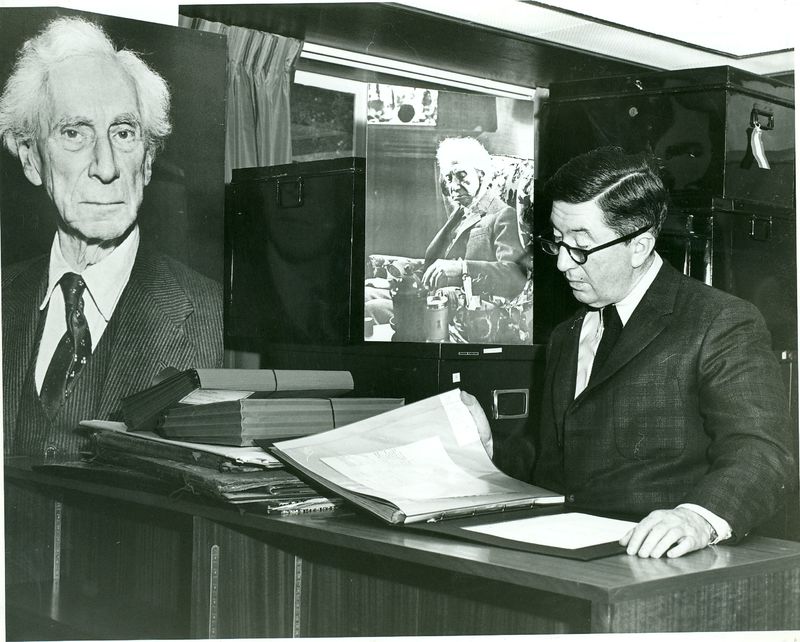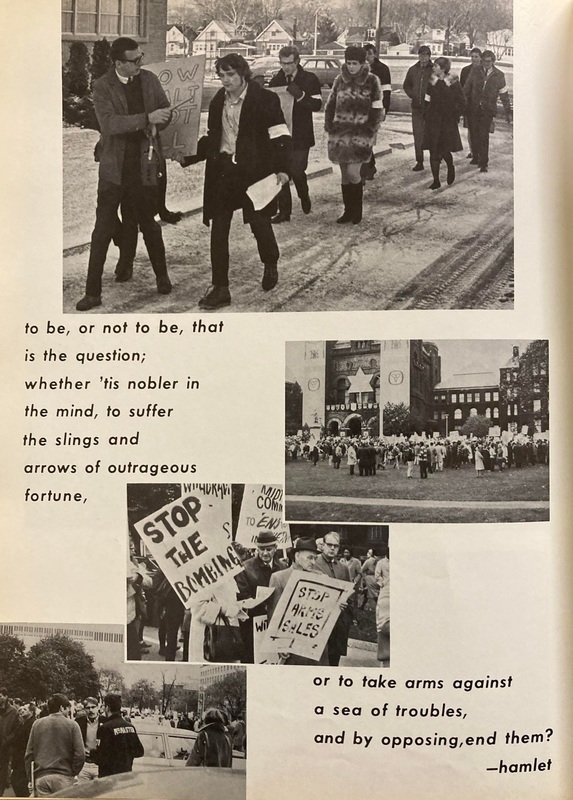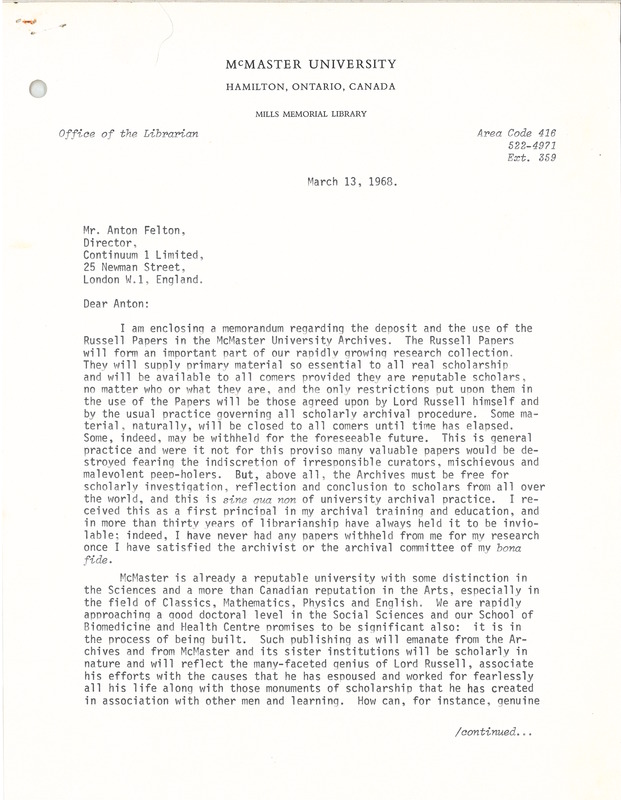McMaster in 1968
Like many college campuses worldwide, the anti-authoritarian spirit of the 1960s inspired many of the youth of McMaster University. Students for a Democratic University (SDU) was a local off shoot of the American Students for a Democratic Society, the most vocal and visible student activist group of the era. SDU members protested the war in Vietnam and even held a memorial for Ernesto "Che" Guevara in October 1968. The conservative, Baptist history of the university was being quietly left behind as a new generation of students, emboldened by the ideals of the '60s, emerged and tried to reshape campus life. Student activism, debates over the war in Vietnam, student representation in university governance, and even the food service at the university became an increasingly visible part of the university experience. It was in this context that McMaster’s head librarian, William B. Ready, acquired the Bertrand Russell archives.
The arrival of The Bertrand Russell Archive
In 1968, the Bertrand Russell archives had been prepared for sale by Anton Felton, Russell’s literary agent and accountant. Russell hoped for a significant sum for the papers to donate to the Bertrand Russell Peace Foundation. These papers included his manuscripts, journals, diaries, and correspondence. In 1968, the initial collection arrived in four parts: the Amberley papers (Russell’s family history); Russell’s manuscripts on philosophy, mathematics, politics, and history; his correspondence, which included letters exchanged with some of the most notable people of the twentieth century, such as T.S. Eliott, Ludwig Wittgenstein, and H.G. Wells; and material related to his peace work, which includes his anti-nuclear activities and correspondence with notable figures and world leaders such as Albert Einstein, Nikita Khrushchev, and Ho Chi Minh. It is estimated that Russell wrote a letter for every thirty hours of his life. The archives initially comprised 150,000 original documents and 3,000 books. (This would only be the first acquisition of the archives; thousands of documents would be added in the years to come).
In the summer of 1966, Kenneth Blackwell, a University of Victoria student, travelled to Wales to meet Russell and was hired to assist in the preparation of cataloguing his papers in advance of their sale. For three weeks he worked in the basement of Russell’s home in Penrhyndeudraeth. When the papers were organized for sale in London, Blackwell contributed to the 340-page catalogue The Archives of Bertrand Russell (ed. Feinberg et al, 1967). When McMaster purchased the archives in 1968, Blackwell was hired by McMaster Librarian William Ready to come to Hamilton to continue his work on the archives, where he held the title of “Bertrand Russell Archivist” for over thirty years.
Russell set out two conditions for the sale of the archives: that the material would be housed in a space open to the public, and that the papers and personal library stay together at the same institution. In one letter to Anton Felton, William Ready writes, “[It] concerns us greatly that [the Russell Archives] find a home here in Canada where they will receive respect, action, and proper housing that are due this finest archive” (43020).
"McMaster Strikes Pay Dirt"(The Silhouette, October 11, 1968)
Despite competition from other institutions across the world, McMaster’s bid to purchase the archives was successful. This purchase was accomplished by McMaster’s University Librarian, William Ready. Ready, with the support of University President Henry G. Thode, pursued the archives with great enthusiasm, raising money for the purchase from donations by the multi-millionaire Cyrus Eaton, the Laidlaw Foundation, and the Atkinson Foundation, and a grant from the Canada Council.
I wrote to Lord Russell advising him of our interest and beseeching him that whatever happened to the archives, they should finally be deposited in a place where they were secure, intact, and available for scholars of all creeds, nationalities, colour, or condition (William Ready interviewed by Ronald Clark [1976]).
The university purchased the archives directly from Russell, and not the peace foundation, because it did not want to be seen as condoning Russell’s political work. This was a clever piece of public relations, as Bertrand Russell gave the entirety of the profits of the sale to the foundation.
University President, H.G. Thode remarked that the collection was “one of the most significant of the twentieth century and the finest major collection ever to come to Canada.” The immediate interest in the papers from scholars and media outlets all over the world helped to establish McMaster’s reputation as a centre for academic research, par excellence.
Bibliography
- Greenlee, James G. (James Grant), and Charles M. Johnston. McMaster University. Montreal: Published for McMaster University by McGill-Queen’s University Press, 2015.
- Griffin, Nicholas, The Selected Letters of Bertrand Russell, Vol. 2. London and New York: Routledge 2001.
- Hemsworth, Wade. “Interview with Kenneth Blackwell, the original Bertrand Russell Archivist”. HA&L magazine issue 11.1. 2018.
- Johnston, Charles Murray, and John C. Weaver. Student Days : Student Life at McMaster University from the 1890s to the 1980s. Hamilton, ON: McMaster University Alumni Association, 1986.
- Stapleton, Rick. “Introduction: Three Passions — Celebrating Bertrand Russell”. HA&L magazine issue 11.1. 2018.


